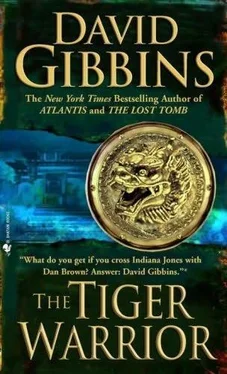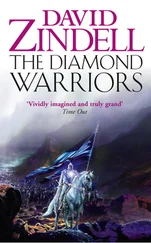David Gibbins - The Tiger warrior
Здесь есть возможность читать онлайн «David Gibbins - The Tiger warrior» весь текст электронной книги совершенно бесплатно (целиком полную версию без сокращений). В некоторых случаях можно слушать аудио, скачать через торрент в формате fb2 и присутствует краткое содержание. Жанр: Прочие приключения, на английском языке. Описание произведения, (предисловие) а так же отзывы посетителей доступны на портале библиотеки ЛибКат.
- Название:The Tiger warrior
- Автор:
- Жанр:
- Год:неизвестен
- ISBN:нет данных
- Рейтинг книги:4 / 5. Голосов: 1
-
Избранное:Добавить в избранное
- Отзывы:
-
Ваша оценка:
- 80
- 1
- 2
- 3
- 4
- 5
The Tiger warrior: краткое содержание, описание и аннотация
Предлагаем к чтению аннотацию, описание, краткое содержание или предисловие (зависит от того, что написал сам автор книги «The Tiger warrior»). Если вы не нашли необходимую информацию о книге — напишите в комментариях, мы постараемся отыскать её.
The Tiger warrior — читать онлайн бесплатно полную книгу (весь текст) целиком
Ниже представлен текст книги, разбитый по страницам. Система сохранения места последней прочитанной страницы, позволяет с удобством читать онлайн бесплатно книгу «The Tiger warrior», без необходимости каждый раз заново искать на чём Вы остановились. Поставьте закладку, и сможете в любой момент перейти на страницу, на которой закончили чтение.
Интервал:
Закладка:
“A curious circumstance occurred to this excellent officer when in the hills. He was informed one day of a sacrifice on the very eve of consummation; the victim was a young and handsome girl, fifteen or sixteen years old. Without a moments hesitation, he hastened with a small body of armed men to the spot indicated, and on arrival found the Khonds already assembled with their sacrificing priest, and the intended victim prepared for the first act of the tragedy. He at once demanded her surrender; the Khonds, half-mad with excitement, hesitated for a moment, but observing his little party preparing for action, they yielded the girl Seeing the wild and irritated state of the Khonds, Captain Frye very prudently judged that this was no fitting occasion to argue with them, so with his prize he retraced his steps to his old encampment.”
“Human sacrifice?” Costas exclaimed, looking horrified. “India? In 1879?”
“That book was published in 1864, fifteen years before the Rampa Rebellion. The full title is A Personal Narrative of Thirteen Years Service Amongst the Wild Tribes of Khondistan for the Suppression of Human Sacrifice. The author, John Campbell, was an army officer charged with the task, and Frye was his assistant.”
“But they failed.”
Jack pursed his lips. “They succeeded. That was the public face of it, anyway. The British didn’t interfere much with ritual in India, but they drew the line at human sacrifice and female infanticide. What they did was drive both practices underground. Who knew what went on in the depths of the jungle, miles from prying eyes. Even today the sacrificial ritual survives among the tribal peoples, though they use chickens instead of humans. Or so we’re told.”
“And in 1879?”
“The rebel leader, Chendrayya, openly executed several native policemen he’d taken captive, giving the executions the semblance of sacrifice in defiance of the British. On one occasion he used a sword, probably a tulwar like the one on the wall over there.” Jack opened the book to an engraving in the frontispiece. It showed a semi-naked woman tied to a pole with a priest in front and a crowd pressing around her, brandishing knives. “But there are hints that actual human sacrifice was also carried out. These involved a meriah, a man, or woman, even a child, who was bought into slavery by the sacrificing tribe, well-fed and well-treated for months in advance, then intoxicated with palm toddy and lashed to a stake.”
“How did they do it?” Rebecca asked quietly.
“It’s pretty unpleasant. They ripped the victim apart with their bare hands and knives. Each man took a strip of flesh home to bury in his own soil before nightfall that day as a kind of fertility offering.”
Rebecca looked pale. Costas took the book. “Why did they do it? Who was the god?”
“I’m coming to that.”
“And that date? Twentieth August 1879?”
“That’s the lynchpin date of the rebellion, and also somehow of Howard’s life. Something happened that day, something I’ve been trying to fathom out ever since I first saw the diary as a kid.” Jack picked up the diary. “Here’s what I know. On that day, a party of thirty sappers were led into an ambush by four hundred rebels, armed with bows and poison arrows and matchlock muskets, as well as some old company muskets they’d stolen from the police. The sappers fought their way back through the jungle to the river. It was one of the biggest fights of the rebellion, with dozens killed and wounded. One British official died, a civil service man responsible for this area who’d accompanied the troops. That day was big enough to hit the news, and was even reported in the London Times and The New York Times, with the name of the officer commanding the sapper party, Lieutenant Hamilton. His account of the fight was printed in the Madras Military Proceedings. Otherwise there are no eyewitness records of that day. But I’m certain something else happened.” “Executions?” Costas murmured. “Sacrifice?” Jack looked at the book. “Hamilton’s foray took place from a river steamer, Shamrock, which had been on its way upriver to a place where the sappers were going to hack a road into the jungle. Lieutenant Howard, my great-great-grandfather, was in overall charge, as the senior subaltern present. As well as Lieutenants Howard and Hamilton, there was another sapper officer, Robert Wauchope, recently returned from Afghanistan, an Irish-American who was a close friend of Howard’s. We’ve already encountered Dr. Walker, the Canadian. He probably had his hands full with cases of jungle fever. I’ve pinpointed where Hamilton’s party came out of the jungle on the riverbank, where the Shamrock must have been. It was the site of a native village. The rebels congregated there and put on a show for them. A pretty spectacular one. Howard was on the steamer. He saw something, or did something, that profoundly affected the rest of his life.”
“What do you mean?”
Jack paused. “He’d been at the top of his class at the Royal Military Academy, one of the officers flagged for great things, perhaps a future army commander like Lord Kitchener, another Royal Engineer. But after the jungle, it was as if he did everything he could to avoid active service again. He’d been detailed to join the Khyber Field Force in Afghanistan, but instead was deployed in Rampa until the end. Then he left the Madras Sappers for secondment to the Indian Public Works Department, and after that went back to England to spend ten years teaching survey and editing the journal of the School of Military Engineering. These were respectable career moves for a Royal Engineers officer, but not for the ambitious soldier he had once been. Even after he returned to India as a garrison engineer in the 1890s he passed up on chances of campaigning. It was only at the end of his career that he was poised for active service again, on the Afghan frontier, twenty-five years after the Rampa Rebellion.”
“What about devotion to his family?” Rebecca said. “Couldn’t that have influenced him?”
Jack looked across at the faded photograph above the chest, showing a woman in a black dress holding a baby, her faced turned down to the child, indiscernible. He turned to Rebecca, nodding slowly. “Howard married young, straight out of the academy. They had a baby boy they adored. They lived in the military cantonment at Bangalore, headquarters of the Madras Sappers. The boy died while Howard was in the jungle several months after that day in August, struck down with convulsions one morning and buried that evening. It was weeks before Howard even knew. His wife never got over it, though they had three more children. Howard was utterly devoted to them, and told his children that he took up his job at the School of Military Engineering in England to get them away from the diseases that had killed their brother, and to be with them when they were at school.”
“He put family before career,” Aysha said. “Nothing wrong with that.”
Jack pursed his lips. “But there was more to it than that. Even after they’d grown up and he’d returned to India, he passed up chances. I’m convinced something happened on that day, 20 August 1879.”
“Sounds like something traumatized him,” Costas said.
“There’s one other thing.” Jack leaned over and opened the lower drawer of the chest. “You remember I mentioned an artifact I’d spoken about to Katya, when she and I saw her uncle’s reference to the Haljit Singh, the Tiger Hand? The one that nearly made her faint? This was it.” He took out a gleaming brass object almost the length of his forearm, and placed it carefully on the table between them. It was semi-cylindrical, and one end had been formed into the shape of a head, with protruding ears and a wide, leering mouth. “Howard brought this back from Rampa. This, the revolver, the little telescope and a few primitive arms captured from the rebels are just about the only artifacts that can be pinned to the campaign. Any guesses what this is?” Jack asked.
Читать дальшеИнтервал:
Закладка:
Похожие книги на «The Tiger warrior»
Представляем Вашему вниманию похожие книги на «The Tiger warrior» списком для выбора. Мы отобрали схожую по названию и смыслу литературу в надежде предоставить читателям больше вариантов отыскать новые, интересные, ещё непрочитанные произведения.
Обсуждение, отзывы о книге «The Tiger warrior» и просто собственные мнения читателей. Оставьте ваши комментарии, напишите, что Вы думаете о произведении, его смысле или главных героях. Укажите что конкретно понравилось, а что нет, и почему Вы так считаете.












